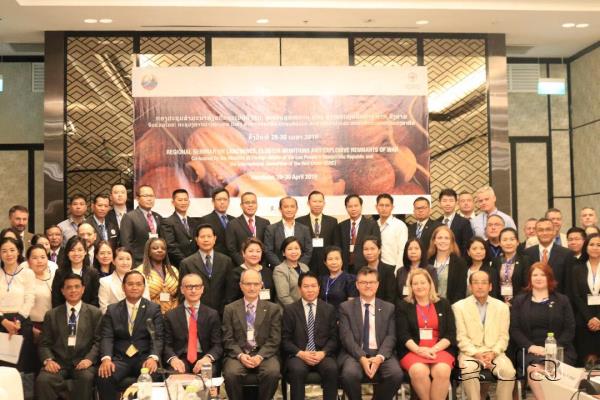KPL
(KPL) Government authorities and international experts from ten countries have gathered for the first Regional Seminar on Landmines, Cluster Munitions and Explosive Remnants of War (ERWs).

(KPL) Government authorities and international experts from ten countries have gathered for the first Regional Seminar on Landmines, Cluster Munitions and Explosive Remnants of War (ERWs).
The two-day seminar organized by the Ministry of Foreign Affairs and the International Committee of the Red Cross (ICR) in Vientiane on April 29.
The seminar was explored the humanitarian impact of anti-personnel mines, cluster munitions and ERWs.
The representatives from the Lao PDR, Cambodia, Vietnam, Thailand, Myanmar, the Philippines and Indonesia, besides from the ICR, the Anti-Personnel Mine Ban Convention and the Convention on Cluster Munitions Implementation Support Units also attended the seminar. The representatives from Ireland, Norway and Sri Lanka shared their experiences and expertise in dealing with these weapons.
“As one of the most affected countries by cluster munitions, the Lao PDR has been pro-active at national, regional and international levels. In this context, the Lao PDR was second country to sign the Convention on Cluster Munitions in Oslo after the host country, Norway and hosted the first meeting of state parties to the CMM in 2010,” said Mr Anouparb Vongnorkeo, Director General of International Organizations Department, Ministry of Foreign Affairs.
“Addressing UXO impact remains a top priority for the Lao government as its heavy contamination continue to pose major threats to the lives of our people, especially children and hampers our national social-economic development efforts,” said Mr Anouparb.
The Lao PDR was among the few countries in the world to adopt its own national Millennium Development Goal called MDG9 in early 2000 and recently launched SDG 18 entitled “Lives Safe from UXO,” clearly reflected in the goals and targets set in the current 8th National Socio-Economic Development Plan (2016-2020).
“The ICRC has played a key role in alerting states about the humanitarian impact of this fatal weapons based on first-hand observations in field operations,” said Mr Giani Volpin, Head of the ICRC’s Mission for Vietnam and Laos.
“This is first such regional seminar and we hope it will encourage a dialogue between states to progress on key challenges such as stockpile destruction, clearance, victim assistance and risk awareness and education,” said Mr Giani Volpin.
Among the ten ASEAN member states, Cambodia, Myanmar, Laos and Vietnam are the worst hit. While they undertake significant demining, they face challenges in terms of clearance, assisting victims and mobilizing resources.
The ICRC is focusing on a multi-disciplinary approach to create synergies between clearance, risk awareness and assistance to victims in the Mekong Region. In addition to supporting the national authorities with capacity building, the ICRC is also supporting the national Red Cross Societies in designing and delivering mine risk education programme.
KPL